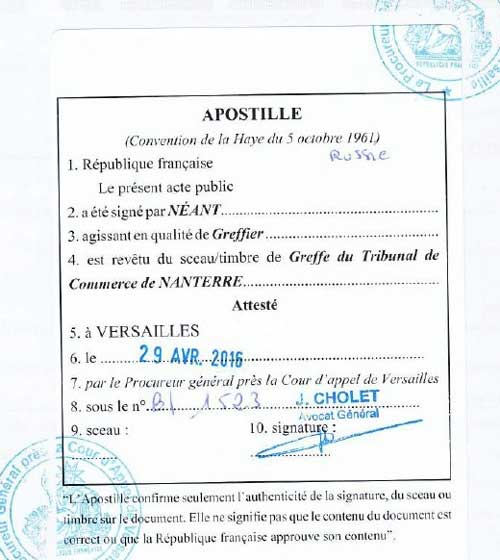
Schmidt & Schmidt компаниясы Францияда берілген құжаттарды заңдастыру қызметтерін ұсынады.
Францияда берілген құжаттар Қазақстан Республикасының мемлекеттік органдары мен соттарында тек апостиль рәсімінен өтіп, қазақ немесе орыс тіліне аударылып, аударма нотариуспен куәландырылған жағдайда ғана заңды күшке ие болады. Мұндай жолмен расталған француз құжаты Қазақстанда құқықтық күшке ие болады.
Апостиль — ресми құжатты беру құқығын растайтын қол мен мөрдің шынайылығын куәландыру, 1961 жылғы 5 қазан Гаага конвенциясында көрсетілген шетелдік ресми құжаттарды заңдастыру талаптарын жеңілдету рәсімі.
Франция 1965 жылы құжаттарды жеңілдетілген заңдастыру рәсімін қарастыратын Гаага конвенциясына қосылған.
Францияда құжаттарға апостиль қоюға құзырлы органдар – аймақтық апелляциялық соттар. Соттар тек өз аумағында берілген құжаттарды растай алады. Федералдық билік органдарының құжаттарын Париж апелляциялық соты куәландырады.
Франциядағы апостиль – француз тілінде жасалған төртбұрышты мөр, «Apostille» тақырыбы және 1961 жылғы Гаага конвенциясына сілтеме (Convention de La Haye du 5 octobre 1961) қамтиды.

Францияда апостиль қоюға болатын құжаттар
- Франция сауда реестрінен анықтамалар
- Нотариус арқылы берілген немесе куәландырылған құжаттар
- Франция соттары берген құжаттар: үкімдер мен сот шешімдері
- Сот аудармашылары жасаған аудармалар
- Франция билік органдары берген ресми құжаттар
- Білім беру құжаттары: аттестаттар, сертификаттар, дипломдар
- Сенімхаттар, өсиеттер, сыйға тарту туралы құжаттар
- Мемлекеттік үлгідегі басқа құжаттар
Апостильге жатпайтын құжаттар
- Коммерциялық келісімшарттар
- Шот-фактуралар мен инвойстер
- Кеден, дипломатиялық, консулдық құжаттар
- Паспорта
- Діни ұйымдар беретін құжаттар
Құжаттарға қойылатын талаптар
Францияда апостильге ұсынылатын құжат міндетті түрде мына элементтерді қамтуы керек:
- Құжатты берген қызметкердің қолы
- Қол қойған адамның лауазымы мен аты-жөні
- Құжат берілген органның мөрі
Францияда консулдық заңдастыру
Егер құжат Гаага конвенциясын мойындамайтын елде қолданылатын болса, мысалы БАӘ немесе басқа елдерде, құжат консулдық заңдастыруға жатады.
Консулдық заңдастыру апостильге қарағанда ұзақ әрі қымбат процедура, құжат Франция СІМ-де, кейін тағайындалған елдің консулдығында куәландырылады. Көбінесе құжатты елдің мемлекеттік тіліне сертификатталған аудармашымен аудару қажет.
Маңызды ерекшелік: Франция СІМ құжат 6 айдан асқан жағдайда арнайы белгі қоймайды.
Құжат тек консулдық белгі қойылған елде заңды күшке ие болады, басқа елдерде қолданылмайды.
Апостильден айырмашылығы, консулдық заңдастыру мемлекеттік және нотариалды құжаттарға ғана емес, коммерциялық құжаттарға да, егер олар сыртқы сауда палатасында куәландырылған болса, қолданылады.
Консулдық заңдастыру мерзімі шектеусіз, бірақ құжаттардың өз мерзімдері болуы мүмкін.
ЕС ішінде ресми құжаттардың шынайылығын тану
Көптілді құжаттар (CIEC конвенциясына сәйкес)
Азаматтық жағдай туралы актілер мен некеге тұруға жарамдылық куәліктері, CIEC халықаралық комиссиясының үлгісіне сәйкес бір елде берілген болса, Францияда ешқандай рәсімсіз мойындалады.
CIEC 1976 жылғы 8 қыркүйектегі Вена конвенциясына қатысушы мемлекеттер (туған, некелескен және қайтыс болғандарды тіркеу туралы көптілді актілер беру):
- Австрия, Германия, Босния мен Герцеговина, Болгария, Эстония, Италия, Кабо-Верде, Кипр, Литва, Люксембург, Солтүстік Македония, Молдова, Черногория, Нидерланды, Польша, Португалия, Румыния, Швейцария, Сербия, Словения, Испания, Турция.
1980 жылғы 5 қыркүйектегі Мюнхен CIEC конвенциясына (некеге тұруға жарамдылық туралы көптілді куәліктерді беру) қатысушы мемлекеттер:
2016 жылғы 6 шілдедегі ЕС Регламенті (ЕС) 2016/1191 – ресми құжаттар туралы
Сонымен қатар, 2016 жылғы 6 шілдедегі ЕС Регламенті (ЕС) 2016/1191 – ресми құжаттар туралы бір елде беріліп, басқа ЕС мемлекетінде ұсынылатын кейбір ресми құжаттарды қолдануды жеңілдетеді. Бұл құжаттарды апостиль арқылы растау талаптарынан босатады, әкімшілік жүктемені азайту және азаматтардың шығындарын төмендету мақсатында жүзеге асырылады.
Апостиль мен консулдық заңдастыру арасындағы айырмашылықтар
Апостиль мен консулдық заңдастырудың ортақ белгісі – олар ресми құжаттың басқа елдің мекемелерінде қолданылуы үшін шынайылығын растайды. Алайда олардың арасында елеулі айырмашылықтар бар.
| Апостиль | Консулдық заңдастыру | |
|---|---|---|
| Шындық | Тек Гаага конвенциясына қатысушы елдер арасында ғана қолданылуы мүмкін. | Гаага конвенциясына қатыспайтын немесе қатысушы еместігінен бір немесе екі ел арасында, немесе бір тарап екінші тараптың қосылуына қарсы болған жағдайда қолданылады. |
| Алу қиындығы | Орташа. Апостиль алу үшін құжат берілген елдің уәкілетті органыға жүгіну қажет. | Жоғары. Консулдық заңдастыру үшін құжат берілген елдің әртүрлі органдарына және консулдықтарға жүгіну қажет |
| Алдын ала растау | Қажет емес. | Қажет. Құжатты берген органнан алдын ала растау қажет. |
| Мақсат елінің консулдығында заңдастыру | Мақсат елінің консулдығына жүгіну қажет емес. | Заңдастырудың соңғы кезеңі әдетте құжат берілген елде мақсат елінің консулдығында өтеді. |
Франциядан құжаттарды талап ету
Азаматтық жағдай туралы құжаттар жоғалған немесе зақымданған жағдайда, сондай-ақ құжаттардың актуалды көшірмелерін алу қажет болса, құжаттардың дубликаттарын сұрату қажет. Көбінесе осы рәсімде қиындыққа Франциядан кеткен адамдар тап болады. Біздің сервис Франциядан құжаттарды қашықтан сұрауға мүмкіндік береді және құжатты әлемнің кез келген нүктесіне курьер арқылы жеткізеді.
Құжаттарды нотариалды аудару
Мемлекеттік органдар тек мемлекеттік тілде жасалған құжаттарды қабылдайды. Шетелдік құжаттарды апостильмен расталған және шетел тілінде берілген жағдайда аударып, аударманы нотариуспен куәландыру қажет. Бізден құжаттарды нотариалды аудару қызметін қазақ немесе орыс тілдеріне тапсырыс беруге болады.
Аудармаға апостиль қою қажет пе?
Бір елде берілген және басқа елде қолданылатын кез келген шетелдік құжат заңдастырылуы тиіс. Францияда жасалып, апостиль қойылған құжаттың орыс тіліне аудармасы шетелдік құжат мәртебесінде қалады, оған апостиль қажет. Көптеген органдар Франциядан расталған аудармаларды қабылдамайды. Аударманы құжат қолданылатын елде жасау ұсынылады.
























































